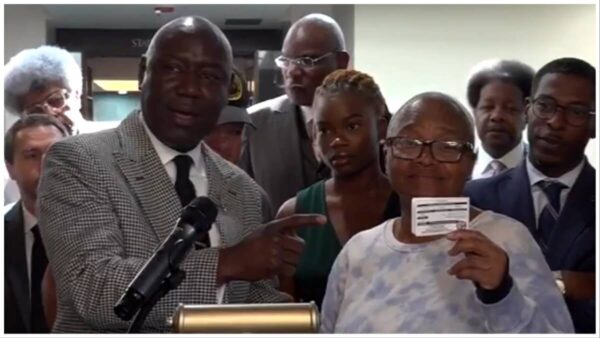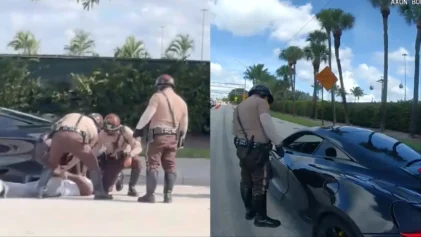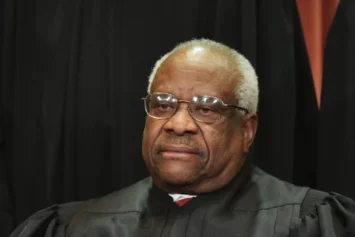A 69-year-old Tallahassee woman is just one of dozens of Black Floridians to be arrested for voter fraud as Gov. Ron DeSantis’ election crimes task force continues their controversial investigations and crackdowns on instances of fraud in the state.
Marsha Ervin was sleeping soundly in her home on Sept. 29 when Tallahassee police knocked on her door after 2 a.m. She let them in, wondering what could be the reason for their visit, and they told her they had a warrant for her arrest.

What Ervin has in common with several other Floridians who face the same charge is that she’s a felon who was able to register to vote after her release from prison.
Trending Today:
- Kamala Harris’ Supporters Race to Her Defense After Anonymous Staffer Criticizes Vice President for the ‘Amount of Time Dedicated to Hair Care’
- ‘I’m Tired of It’: Outraged Suburban St. Louis Mom Says Her Daughter Had to Wear Headphones to Drown Out Racial Slurs
- Los Angeles Official Caught on Audio Comparing Black Boy to ‘Monkey’ Says She Didn’t Mean to be Racist, Claims Life Is Destroyed
She was sent to prison in 2016 after being found guilty of aggravated neglect of an elderly person and released in 2018. Upon her release, officials at the prison never issued her any information on whether or not she could vote. However, she went on to successfully register to vote in 2020.
Although court records show Ervin is still on probation and can’t vote until November 2023, the government issued her a voter registration card in 2020, and she voted in the 2020 general election and the 2022 primary election.
The Florida Department of Law Enforcement began looking into Ervin’s voting record after investigators received some information from the Office of Election Crimes and Security, a task force that DeSantis recently established to investigate voter fraud allegations.
Ervin’s attorney, Mutaqee Akbar, insisted that she thought she was able to vote after she was released in 2018 due to news reports announcing that the voting rights of hundreds of thousands of felons would be restored.
Amendment 4, which voters approved that year, allowed 1.4 million people with past felony convictions to vote. Only those convicted of murder or sex crimes were barred.
Months later, DeSantis signed a bill the Florida Legislature passed to withhold voter eligibility for hundreds of thousands of felons until they met their past legal financial obligations. Confusion and controversy ensued as a result. Many voters couldn’t determine their own eligibility, and the Florida Rights Restoration Coalition filed a federal lawsuit due to the conflicting statutes.
“Amendment 4, almost 1.4 million Floridians disenfranchised because I believe we have a discriminatory criminal justice system that targets people of color and that’s why a disproportionate number of those who they are trying to block to vote are Black and Brown people in Florida,” attorney Ben Crump said at a news conference on Ervin’s arrest. Crump is now part of Ervin’s legal team.
Tallahassee NAACP leaders joined Crump for that presser to call on police and the local prosecutor’s office to drop Ervin’s charges.
“If we don’t stand for Ms. Marsha, God help us, because it’s Ms. Marsha today. It will be all of us tomorrow,” Crump continued.
“We’ve seen 63 or so arrests throughout the state, and a lot of them are aligned with Ms. Ervin’s situation,” Akbar said at the press conference.
“Voter fraud is somebody who knows that they can’t vote, it’s clear that they can’t vote and there’s some intent behind that, and they vote even knowing that they can’t. In this situation, Ms. Ervin was clear that, ‘Hey, I thought I could vote, I applied, I got my card, and I received it back and that’s the reason why I voted,'” Akbar added as an explanation to reporters on what distinguishes Ervin’s case from textbook cases of voter fraud.
Several other formerly incarcerated Floridians who are facing the same issue as Ervin were also arrested and charged.
Just this year, 63-year-old Toye La Rocca was arrested in Fort Walton Beach for voting while still on probation. She told investigators she was confused by the arrest since she was issued a voter registration card.
The same thing happened to 57-year-old Ronald Lee Miller in Miami last August. Although he was convicted of murder, a campaigner at a grocery store told him he was eligible and encouraged him to register. He was also issued a voter registration card, but police came to his home with a warrant for his arrest.


